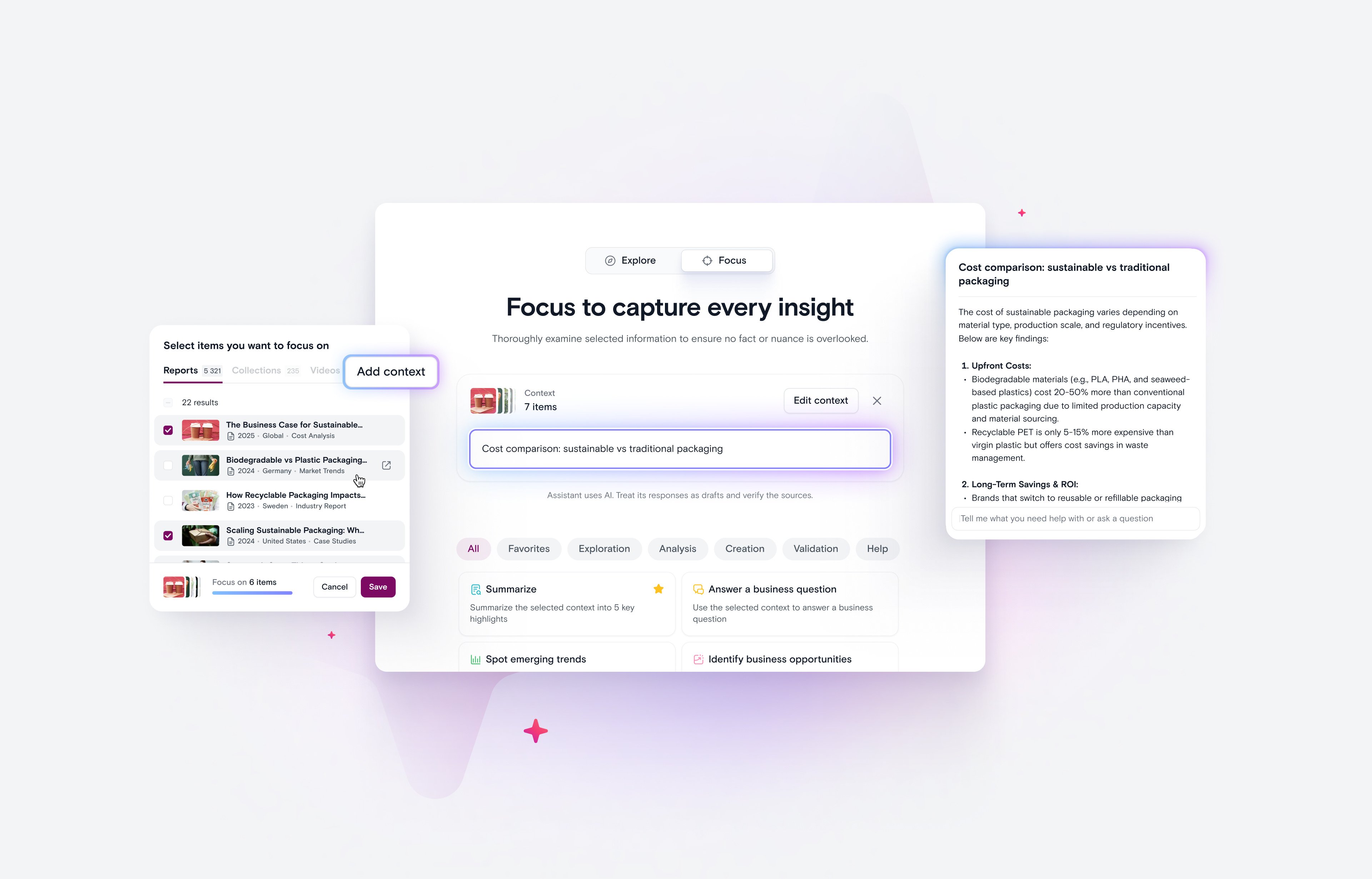Consumer Centricity with Estrella Lopez-Brea, General Mills

In our first-ever Spotlight episode, Stravito CEO Thor Olof Philogène sat down with Estrella Lopez-Brea, Head of Insights for Snacks, Ice Cream, and Compete at General Mills to discuss the concept of consumer centricity. With over 20 years of experience from leadership positions in iconic FMCG companies such as Coca-Cola, Nestlé Cereal Partners, and most recently General Mills, Estrella has a wealth of expert insights to offer.
You can listen to the full interview, with live audience Q&A, here:
T: Now when we reached out about having you as a guest for this webinar, you said consumer centricity is close to your heart. How did that happen? And when?
E: Well, I actually don't think it happened. I mean, I have been in the insights world as you mentioned for more than 20 years, all my career, a long time now. And being close to the consumer has been not only part of my job, but also something that I have a passion for––understanding people's lives and culture. What are the tension points that they have? What are the things that they dream about? Those kind of things are just something that I've always been focused on. In a way, it’s what I do for a living, but I do see myself as kind of helping organisations grow by putting consumers at the centre of what they do. So that's how I see my role. Like some kind of catalyst of the consumer, someone that helps businesses and brands to better understand their target consumers so that they can launch better communications, launch better and faster innovations, build bolder brands. Those are the kind of things that I see.
So in this sense, I feel really frustrated sometimes when I hear stories from people that don't see the value of being consumer-centric or don't even understand well what it means. Because I really think that when this happens, it’s either caused by a lack of understanding from people who are a little bit far from this function and what we can do, or that people in our function don't aim high enough.
"I think there is the assumption that this role is about taking projects and making studies, instead of being a strategic business partner."
I think there is the assumption that this role is about taking projects and making studies, instead of being a strategic business partner. And in that sense, I believe the dialogue needs to change. I think the conversation needs to change from “I need to do a focus group” (which I still sometimes hear) to “I have an important question that the business needs to answer, how can we tackle it together?”. That is what brings value to the organisation, and that is when our function transforms from providing a transactional value. From “I need this” and “I give you that” to something bigger, which is a strategic partner of growth opportunities..
So the good thing is that I'm not making this up, there are studies that prove that and that putting the consumer at the centre actually works.
T: And the evidence for that [consumer centricity works]?
E: Sure. There have been conversations about the importance of being consumer-centric for a very long time and also several studies. The last one I have in my head is one from 2018 from Watermark Consulting which provides evidence that those companies that are actually focused on the consumer experience, actually outperform the market because they bring value, either strategic or economic value, to the organisations in a way that is different from other companies. So I now have evidence to prove that what I do for a living actually works; it’s not just perception, it’s reality.
T: You recently started a new role within General Mills, and you said you’re launching a “customer obsession” program in that. Why the move from consumer centricity to consumer obsession?
E: I think every company nowadays claims to be consumer-centric, right? It's kind of a fancy word to use now, but I don't think necessarily every company is. So when we were developing this program, I wanted to avoid that. I wanted to go one step further and turn consumer closeness from just being a slogan to being more of a mindset or culture. And that's why we went for the language “consumer obsession”––because being close to consumers is not enough.
"Consumers don't wake up in the morning, thinking about us, our brands, or our companies."
It was about trying to transmit the need for all of us to take advantage of every opportunity to listen, to observe our consumers, to feel how they feel, and to be close to them. Consumers don't wake up in the morning, thinking about us or our brands or our companies. So it has to be the other way around.
We have to be some kind of obsessed with them. If we want to keep our jobs, if we want to keep growing in our businesses, we have to change it to be the other way around because we are the ones who need to be obsessed with our consumers. That's what being consumer-centric means to me.
And there's a lot of reasons why I think being consumer-centric is important and rewarding for companies beyond the study that I just mentioned. But I think first of all, we're not our consumers. We're not. I mean, we might have coincidentally similar behaviours. We might consider similar products, but we're not the consumer.
"We might consider similar products, but we're not the consumer."
The moment that someone projects the consumer onto themselves or someone close to them, then that is their truth, right? And there's no way to change that––that one specific experience becomes the reality, and that bias stays there for the rest of the journey. So that’s one of the reasons why I think there's definitely room for all of us to talk about consumer centricity and keep making it a priority in organisations.
But I also think that truly being consumer-obsessed or consumer-centric, builds intuition and confidence in teams to move forward without the need to research every single tiny thing.
T: I’m sure many of the people listening are also planning or even under way with consumer centricity initiatives in their organisations. Do you have any final tips on pre-requisites or pitfalls to avoid with them? What are your top 3 tips?
E: I think that there are several things to take into account for making consumer centricity really work.
First, I think there has to be engagement, excitement, and buy-in from the leaders of the organisation. Because that is the way to turn consumer closeness into part of the culture. And because what they do kind of cascades down to the rest of the organisation
Number 2 would be the fact that being close to the consumer is not the responsibility of the insights function. It's everyone's responsibility. It's not our job. I cannot be responsible for you not being close to your consumer. Simply like that. I can of course, as part of my function and my role in the organisation, provide the tools, provide methods, provide guidance, provide opportunities for the different employees to participate, to do activities, to watch videos, to engage with a consumer. Of course, that is my role.
"It’s everyone’s role. It’s everyone’s responsibility."
But I cannot be responsible for the organisation being or not being close to the consumer. It’s everyone’s role. It’s everyone’s responsibility. Because it unifies teams to move in the same direction. And that’s where the value starts to come. When you see a team of people, for example, that are launching a new product––it makes such a difference when you have only the CI person in that team knowing the consumer compared to when you have the full team knowing that consumer.
And the last one I would say that you have to make it easy. It cannot be complex. It has to be using a platform that everyone is using, making it fun, creating activities or opportunities for people to engage, asking people to participate, to send videos, to watch the videos that you sent, to bring external speakers. You have to make it engaging and fun somehow. Otherwise we're all really busy, so there has to be some reward in that sense.
To hear all of Estrella’s insights, wisdom, and detailed examples, you can listen to the full recording, with live audience Q&A, here:
Related Content

The Role of AI in Decision-Making: Smarter Insights or Faster Mistakes?
Thor Olof Philogène Apr 3, 2025

To Maximize the Value of Your Research, Start with Knowledge Management
Sarah Wiggins Mar 27, 2025

Stravito Enhances GenAI Assistant to Accelerate Time-to-Insight
Charlotte Hilton Mar 20, 2025